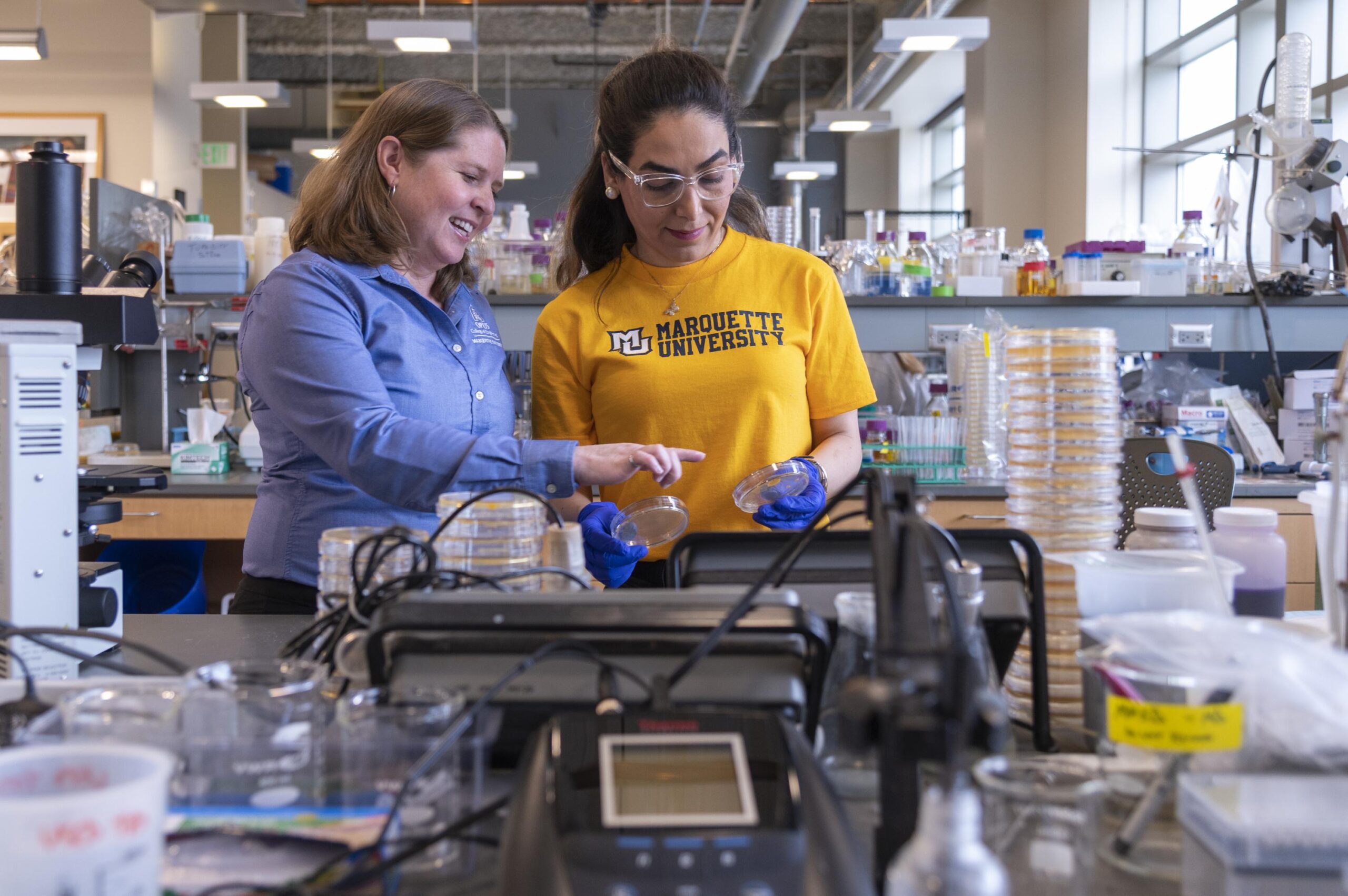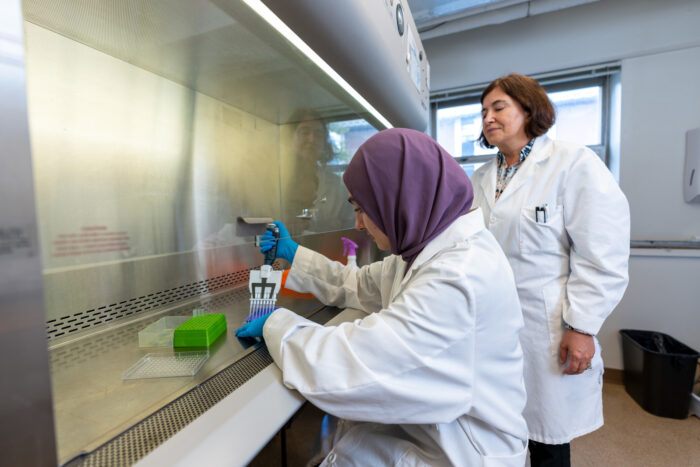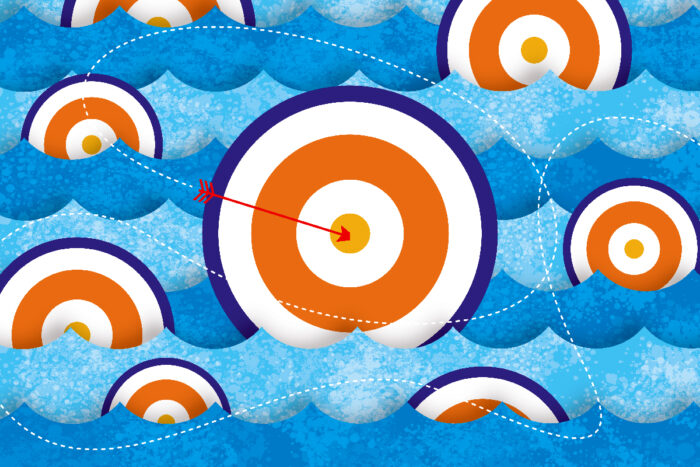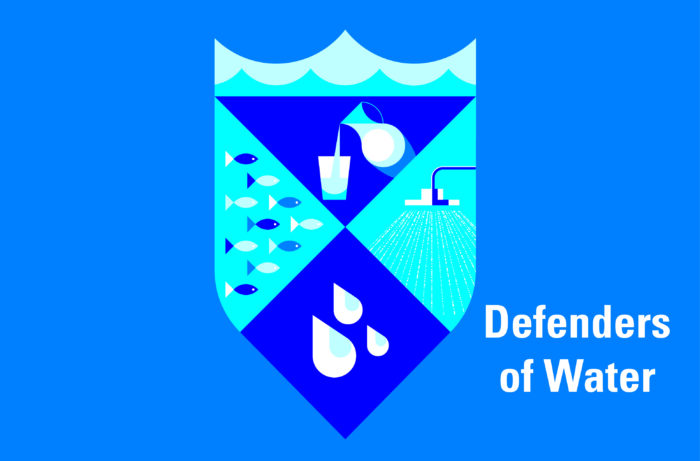Marquette’s “In Defense of Water” project has received its third grant from the U.S. Department of Defense, worth $4.2 million, to continue developing novel, sustainable technologies to protect human health and the environment, treat sewage, and provide clean drinking water and a framework for emergency response to water contamination.
The partnership with the U.S. Army Corps of Engineers began in 2021 with an initial $3.8 million award and increased the scope of the research with another $3.8 million in August 2023. This third award supports the extension of six areas of research and the launch of a new area of focus, bringing the total to nine active areas overall.
“This partnership with the U.S. Department of Defense has created a tremendous opportunity to expand our water research capabilities at Marquette,” said Dr. Brooke Mayer, professor of civil, construction and environmental engineering, and principal investigator on this phase. “This continued partnership and support are opening the door to address critical water-related challenges. It’s such a unique opportunity to develop interdisciplinary solutions to enhance water resiliency while providing dual benefits to the public good and military operations.”
The focus of “In Defense of Water” continues to be improving water security and efficiency on military installations to reduce negative readiness and operational impacts due to water shortages and employ innovative water management technologies. Furthermore, the work addresses cleanup related to PFAS at current and former military installations, including many in Wisconsin. Several highlights from ongoing efforts include the development and evaluation of two different processes to rapidly treat wastewater via 1) chemical oxidation and reverse osmosis and 2) an anaerobic membrane bioreactor that relies on microorganisms that convert pollutants to methane gas that is burned for renewable energy. Additionally, researchers have been able to remove more than 90% of PFAS from real-world samples and are planning field-scale tests in Wisconsin as part of upcoming project work.
“We are grateful to our partners with the Department of Defense, as well as Rep. Gwen Moore and Sen. Tammy Baldwin, for their ongoing commitment to advancing water research,” said Dr. Jeanne Hossenlopp, vice president for research and innovation. “Their support has not only benefited Marquette’s growing water research community, but made possible promising advances in avenues for clean, secure water in our communities.”
Whereas Phase 2 continued three of the initial four areas of study with four additional areas, this third phase builds on earlier findings to expand efforts in six areas with the addition of a seventh. Areas of study that are expanding in the current project include remediation of PFAS; drivers and technology for water reuse; climate resilience at the water-energy nexus; the development of advanced data-fusion technologies to better understand linkages between pollutants, ecosystem health, and stormwater assets; understanding biofilm control in water distribution and storage systems; and how lead and water chemistry are linked to clinically relevant antibiotic resistance genes.
A new emphasis in the third phase is an area led by Dr. Fabien Josse, professor, and Dr. Chung Hoon Lee, associate professor, in the Department of Electrical and Computer Engineering, to develop sensors to detect and monitor PFAS and other water contaminants such as heavy metals and hydrocarbons.
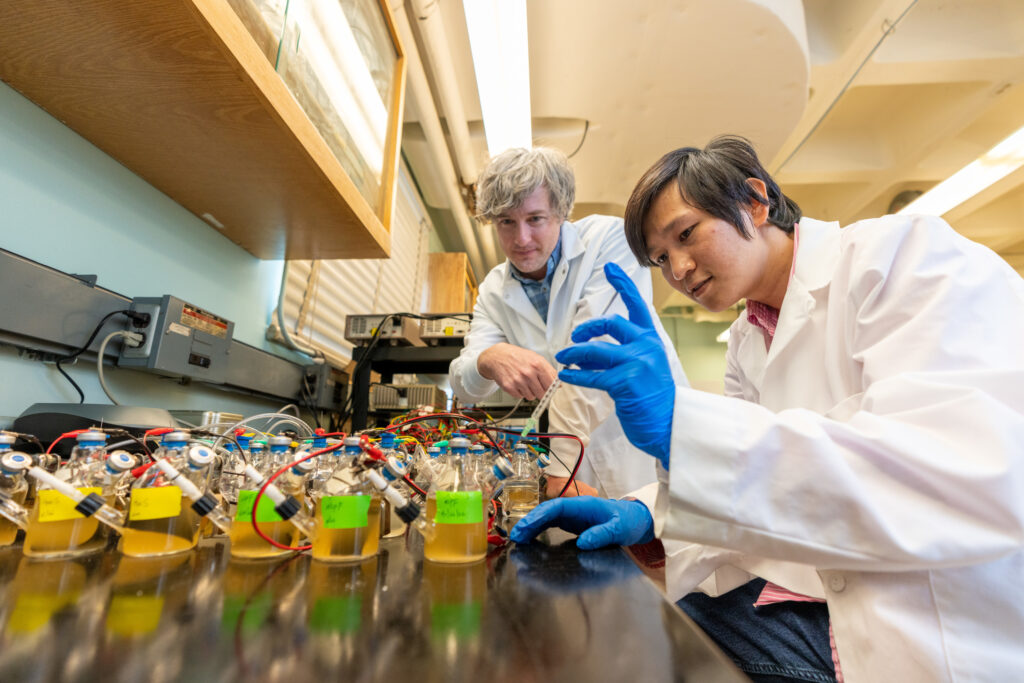
This new phase of “In Defense of Water” has expanded the number of water researchers from Marquette to 17, including 12 who have led areas of study over the three phases and three different principal investigators in Mayer, Dr. Daniel Zitomer, professor and chair of the department of civil, construction and environmental engineering, and Dr. Krassimira Hristova, professor of biological sciences, each of whom remain active in Phase 3.
Other faculty investigators for Phase 3 include: Dr. Chris Marshall (Area 7), assistant professor of biological sciences; Dr. Walter McDonald (Areas 4, 5), associate professor of civil, construction and environmental engineering; and David Strifling (Areas 3, 4), associate professor of law and director of the Water Law and Policy Initiative, who have collaborated in each of the three phases; and Dr. Joseph LaManna (Area 5), assistant professor of biological sciences. Joining “In Defense of Water” for the third phase are Dr. Somesh Roy (Area 4), associate professor of mechanical engineering; and Dr. Cristinel Ababei (Area 2), associate professor, Dr. Florian Bender (Area 2), research assistant professor, and Dr. James Richie (Area 2), associate professor, in the Department of Electrical and Computer Engineering.
Throughout each of the project’s phases, many of the principal and area lead investigators are participating in other areas.
The U.S. Army Engineer Research and Development Center (ERDC) is an integral component of the Office of the Assistant Secretary of Defense for Research and Engineering and helps solve the nation’s most challenging problems in civil and military engineering, geospatial sciences, water resources, and environmental sciences for the Army, Department of Defense, civilian agencies, and the nation’s public good. The ERDC strives to be the world’s premier public engineering and environmental sciences research and development organization.
More information on the seven areas of the third phase of “In Defense of Water”
- Area 1: Remediation of PFAS via Electrochemical and Biological Treatment
- Lead investigator: Patrick McNamara, professor of civil, construction and environmental engineering
- Area 1 will build on Phase 2 findings to advance new applications of chemistry and electricity to remove PFAS from water. Specifically, the investigators will perform research focused on catalyzed electrochemical and biodegradation treatment of two PFAS compounds listed as Hazardous Wastes: PFOA and PFOS. The systems may be used in a range of applications, including drinking water treatment, wastewater treatment and in situ PFAS removal in soils and sediments. This project will advance knowledge essential for scaled system implementation, including reactor configurations, tests with real waters, and field-scale tests.
- Area 2: Develop sensors for detection and monitoring of PFAS and other water contaminants such as heavy metals and hydrocarbons
- Lead investigators: Fabien Josse, professor, and Dr. Chung Hoon Lee, associate professor, in the Department of Electrical and Computer Engineering
- New in Phase 3, Area 2 will develop a cost-effective system that can continuously monitor PFAS and lead in drinking water using a sensor that does not contact the water directly, hence increasing system longevity. In parallel, (electro)chemical sensors will be developed for real-time rapid quantitative monitoring of remediation activities.
- Area 3: Drivers and technologies for water reuse
- Lead investigator: Brooke Mayer, professor of civil, construction and environmental engineering and principal investigator of the phase III grant
- Area 3 will advance design, implementation, and testing of decentralized water reuse systems. The work will build on previous research in which physical-chemical treatment processes including ozonation, membrane filtration, and UV disinfection have been evaluated for treatment chemical and microbial contaminants. The study will contextualize drivers (and barriers) to water reuse in different settings as well as test chemical and biological contaminant mitigation in a range of water reuse unit processes relevant to decentralized treatment applications. Different water qualities and scales of operation will be evaluated, which will inform fundamental system understanding as well as facilitate process scale-up for full-scale implementation.
- Area 4: Climate resilience at the water-energy nexus
- Lead investigator: Anthony Parolari, associate professor of civil, construction and environmental engineering
- Area 4 will develop synergistic modeling approaches to conceptualize, quantify and understand the dynamics and climate sensitivity of water-energy resilience technologies. This effort will establish new quantitative metrics for the resilience and reliability of water infrastructure; quantify trade-offs and synergies among water and energy resilience technologies with respect to thermal loads; and quantify the impact of climate variability, change, and uncertainty on the feasibility and operation of water resilience technologies.
- Area 5: Data fusion to assess and predict broad-scale effects of non-point source pollution on environmental health and stormwater asset management
- Lead investigator: Joseph LaManna, assistant professor of biological sciences
- Area 5 builds on the previous phases to continue development of advanced data-fusion technologies to better understand linkages between pollutants, ecosystem health, and stormwater assets. The central goal of this research thrust is to use remote sensing data and machine learning models to support stormwater asset management and assess the impact of human development on downstream water bodies and vegetation. To date, the Area 5 team has been developing novel methods to assess the plant coverage of stormwater management practices and of vegetation phenology across multiple spatial scales. Major achievements include capturing multispectral imagery of green stormwater infrastructure using drones at four case study sites, applying unsupervised machine learning algorithms to successfully classify the land cover, and integrating dimensionality reduction to improve computational performance.
- Area 6: Disinfection: Biofilm control in onsite water storage systems using bacteriophage treatment
- Lead investigator: Krassimira Hristova, professor of biological sciences
- The team is investigating the microbial ecology of biofilms that form on everything water touches in buildings including pipes, sinks and shower curtains. In addition to learning more about what is killed by typical disinfectants and what comes back after their use, the team is studying UV treatment and novel disinfection approaches that are effective for controlling the presence and growth of bacteria and viruses on surfaces and in biofilms. The first two phases yielded more efficient methods of inactivation of biofilm formed by two different illness-causing microbes on PVC coupons in tap water and a way to more efficiently chemically disinfect Staphylococcus aureus and Candida albicans present in multispecies biofilms. Interactions between biofilms and viruses, including the impact of such mixtures on disinfection strategies, are also being studied. The third phase will allow the team to focus on bacteriophage treatment as a promising new tool for controlling bacterial biofilms in onsite water treatment systems and in the built environment, thereby preventing infections.
- Area 7: Lead
- Lead investigator: Chris Marshall, assistant professor of biological sciences
- Area 7 is researching the relationship between metals and the microbial communities within drinking water distributions systems, focusing on their influence on antibiotic resistance. The team aims to understand the impact of metal corrosion products from lead and copper pipes on the microbiome and resistome. In past phases, corrosion products were added to various different source waters followed by measurements of multiple water quality parameters and culturable antibiotic-resistant bacteria. Furthermore, samples were collected to analyze the microbial community. Currently, the microbial community samples have been sequenced and we are working on processing the sequenced reads and starting data analysis. In this phase, the team will explore how different water quality factors, including disinfectants, affect the influence of these corrosion products on antibiotic resistance.
